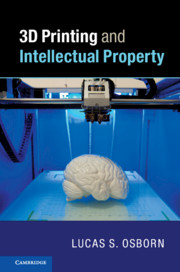Book contents
- 3D Printing and Intellectual Property
- Reviews
- 3D Printing and Intellectual Property
- Copyright page
- Contents
- Acknowledgments
- Abbreviations
- Introduction
- 1 3D Printing Technology’s Capabilities and Effects
- 2 How 3D Printing Works and Why it Matters
- 3 Primer on Intellectual Property Law
- 4 Can You Patent a 3D Printable File? (and Why it Matters)
- 5 Patents – Direct Infringement, Individual Infringement, and “Digital” Infringement
- 6 Patents – Indirect Infringement and Intermediaries
- 7 3D Printing and Trademarks: The Dissociation Between Design and Manufacturing
- 8 Creativity and Utility: 3D Printable Files and the Boundary Between Copyright and Patent Protection
- 9 Design Rights, Tangibility, and Free Expression
- 10 DMFs and Optimizing Innovation Incentives
- Conclusion
- Index
10 - DMFs and Optimizing Innovation Incentives
Published online by Cambridge University Press: 24 July 2019
- 3D Printing and Intellectual Property
- Reviews
- 3D Printing and Intellectual Property
- Copyright page
- Contents
- Acknowledgments
- Abbreviations
- Introduction
- 1 3D Printing Technology’s Capabilities and Effects
- 2 How 3D Printing Works and Why it Matters
- 3 Primer on Intellectual Property Law
- 4 Can You Patent a 3D Printable File? (and Why it Matters)
- 5 Patents – Direct Infringement, Individual Infringement, and “Digital” Infringement
- 6 Patents – Indirect Infringement and Intermediaries
- 7 3D Printing and Trademarks: The Dissociation Between Design and Manufacturing
- 8 Creativity and Utility: 3D Printable Files and the Boundary Between Copyright and Patent Protection
- 9 Design Rights, Tangibility, and Free Expression
- 10 DMFs and Optimizing Innovation Incentives
- Conclusion
- Index
Summary
Chapter 10 takes a broader look at IP protection as an incentive to innovate. Patent protection gaps brought about by 3D printing technology must be viewed in conjunction with how the technology dramatically lowers the costs of innovation (and imitation) for 3D printable goods. Moreover, although patents serve as a primary incentive to innovate, they are not the only incentive. The chapter looks at other IP rights, contracts, and extra-legal appropriability mechanisms, as well as nonmonetary incentives to innovate, to determine how the IP regime should respond to 3D printing technology. I describe the need for a better empirical understanding of 3D printing’s effects on innovation incentives, but I argue that current evidence does not suggest a need for stronger IP incentives for 3D printable goods. Therefore, radical changes to patent law are not necessary even in the face of de facto weakened patents. In addition, because copyright protection is not needed as an extra incentive for utilitarian innovation, copyright law should not protect DMFs of primarily utilitarian objects.
Keywords
Information
- Type
- Chapter
- Information
- 3D Printing and Intellectual Property , pp. 203 - 227Publisher: Cambridge University PressPrint publication year: 2019
